Proper vaccination is indispensable to realize the wish to start a new life overseas with a beloved pet. In recent years, an increasing number of pet owners are considering overseas travel and emigration with their pets, and with this increase comes a growing need for accurate information on vaccinations.
This article provides a thorough explanation of the latest regulations and precautions regarding vaccines that are essential for international travel.
Pet Vaccine Basics: Important Points for International Travel
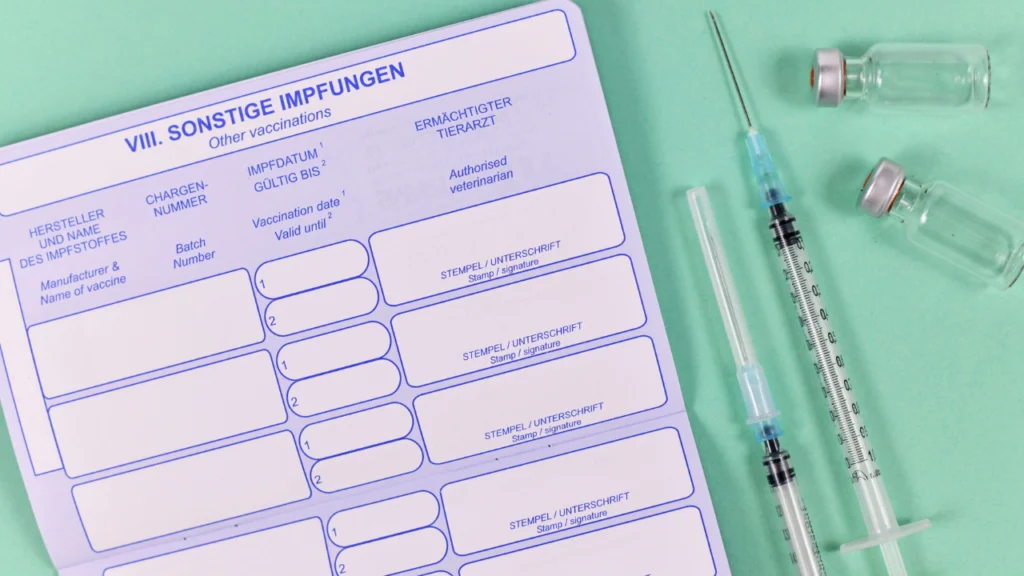
Vaccination is not just a precautionary measure; it is a legal requirement for international travel. The World Health Organization's (WHO) 2024 guidelines reiterate the importance of infectious disease prevention in international pet travel.
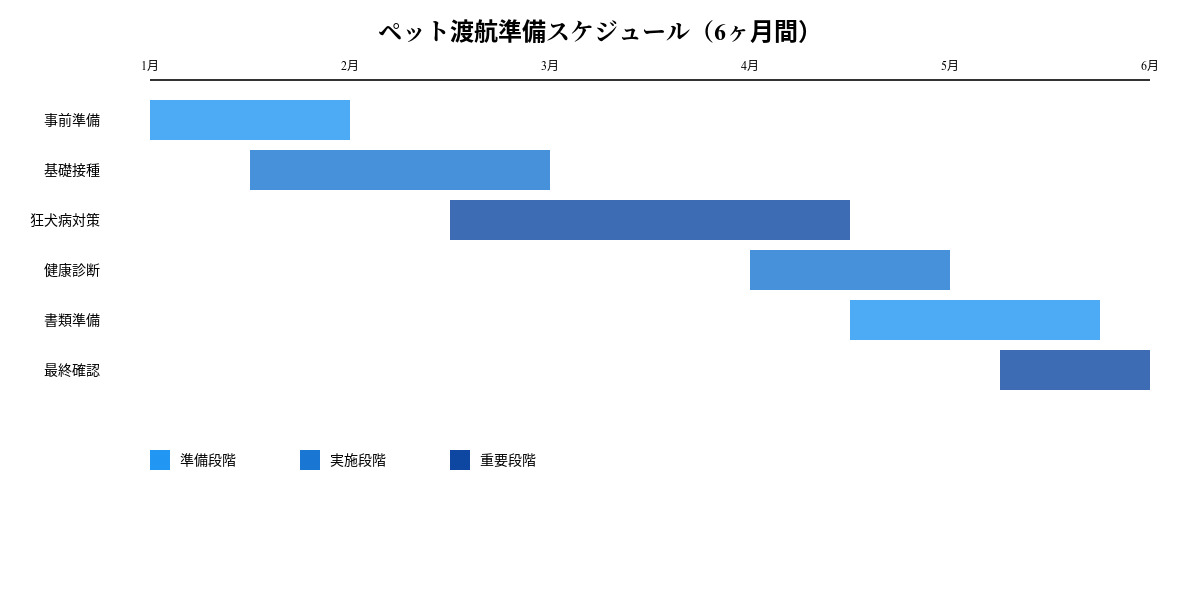
Types and characteristics of essential vaccines: a detailed comparison
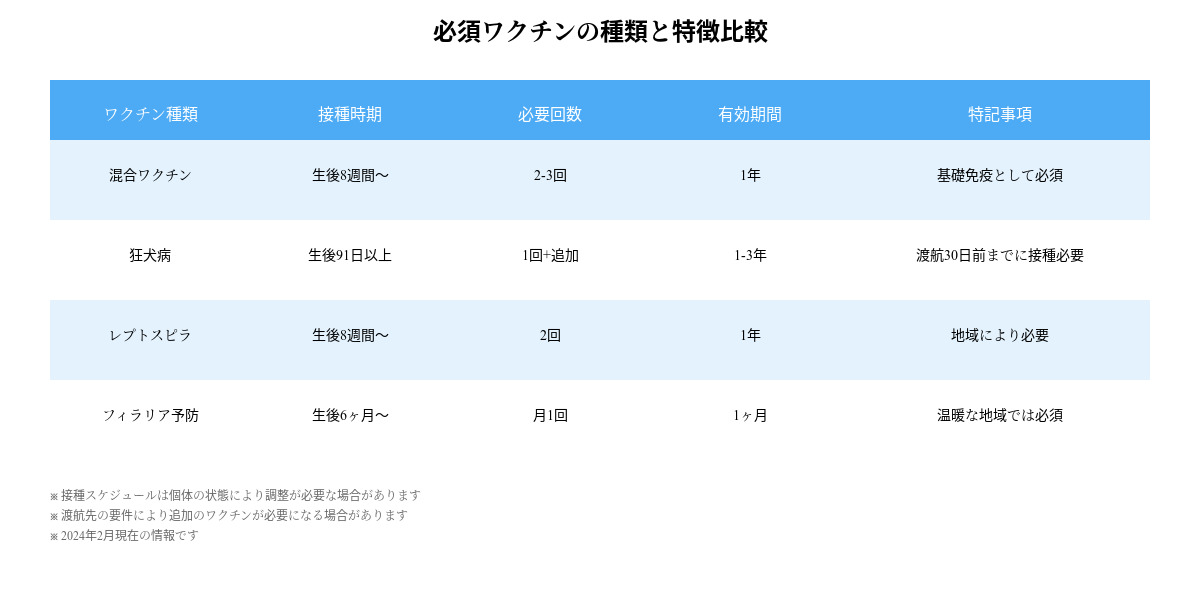
Understanding the characteristics and importance of each vaccine is the first step toward safe international travel. The table below provides a detailed comparison of the major vaccines.
Details and importance of combination vaccines: a thorough explanation of the role of each component
1. leptospirosis
Route of Transmission: Transmitted through contact with urine of infected animals or contaminated water. The risk of infection is particularly increased in warmer climates. The World Health Organization (WHO) reports more than 100,000 cases of infection annually, especially in Southeast Asia and tropical regions.
Main Symptoms
Acute phase (2-7 days after infection)
-
- High fever (>40°C)
- Severe vomiting
- anorexia
- Hyperemia of mucous membranes
Progressive phase (from 1 week later)
- jaundice
- renal failure
- bleeding tendency
serious cases (of illness)
-
- multiple organ failure
- Fatalities: 80% or higher without treatment
Treatment and Prevention
Early detection and treatment are important. Although antibiotic treatment is the basic treatment, vaccination is the most effective measure. Especially in the case of overseas travel, prior vaccination is always recommended, taking into consideration the possibility that the local medical system may not be in place.
2. canine parvovirus infection
infection route
Transmitted through direct or indirect contact with feces of infected dogs. The virus has very strong environmental resistance and is difficult to inactivate with ordinary disinfectants. The risk of infection is particularly high in puppies and is characterized by a long survival period in warm climates.
Main Symptoms
Early onset (3-7 days after infection)
-
- Severe vomiting
- bloody stool
- Severe dehydration
advanced stage
-
- leukopenia
- Risk of sepsis
- Electrolyte imbalance
Puppies
-
- Risk of sudden death due to acute myocarditis
- Severe disease in the first 24-72 hours after onset
Latest treatment data (2024)
- Recovery rate with early treatment: approx. 851 TP3T
- Average duration of treatment: 5-7 days inpatient management
- Approximate treatment cost: 150,000-300,000 yen (varies by region)
- Immunity acquisition rate after cure: approx. 951 TP3T
3. canine distemper virus infection
infection route
Transmitted by contact with respiratory secretions of infected dogs or by airborne transmission. Young dogs and immunocompromised individuals are especially susceptible to severe cases.
Main Symptoms
Initial symptoms (3-6 days after infection)
-
- high fever
- Decreased energy and appetite
- conjunctivitis
advanced stage symptoms
-
- pneumonia
- neurological symptoms
- Hardening of the skin
Current status of treatment (2024 data)
- Cure rate: 50% for early detection
- Incidence of sequelae: approx. 301 TP3T in survivors
- Treatment period: 2 weeks to several months
Rabies Vaccine: The Most Important Vaccine for International Travel
Important:Rabies vaccine is a requirement for entry into almost all countries. The World Health Organization (WHO) reports that in 2024, approximately 59,000 people die annually from rabies, with more than 951 TP3T of those deaths occurring in Asia and Africa.
Basic Information on Rabies Vaccine
Minimum age for vaccination
91 days old or older
Number of times required
-
- Initial inoculation: 1 dose
- Additional inoculation: 1 year later
- Thereafter: every 1-3 years (depending on vaccine type)
Antibody titer test
-
- Required antibody titer: 0.5 IU/ml or higher
- Testing time: 30 days after vaccination
- Inspection validity period: 2 years
Timeline for travel

Rabies is explained in detail in the following article.
Vaccine Regulations and Required Documents by Country/Region (Latest information in 2024)
*Regulatory conditions are subject to change at any time. Requirements differ depending on the country of entry, so please be sure to check the official information website of each country for the most up-to-date information.
Europe (EU)
Essential Requirements
rabies vaccine
-
- Inoculation period: Valid inoculation required at least 30 days prior to travel
- Testing time: 30 days after vaccination
microchip implantation
-
- Standard: ISO 11784/11785 compliant
- Implantation timing: before or at the same time as vaccination
EU-style pet passport
-
- All vaccination records
- Health certification by a veterinarian
- Microchip Information
Additional requirements by country
United Kingdom
- Proof of Treatment of Striped Worms (Echinococcus)
- Veterinary medical examination 24-120 hours prior to travel
The following article explains in detail how to travel to the UK with your pet.
Scandinavian countries
- Treatment of echinococcosis (Finland, Norway, etc.)
- Proof of parasite control 24-48 hours prior to entry
North America
America
- * Rabies vaccine (required only in designated countries)
* Must be within the validity period
* Antibody titer test (required only in designated countries)
* Filing of CDC Form 77.37
* With additional state-specific requirements
Canada
- Rabies vaccine certificate (in English or French)
- More than 30 days after inoculation
- Health certificate from a veterinarian (within 10 days)
Asian region
Singapore
- Rabies vaccine (required) At least 30 days after vaccination
- Rabies antibody titration test (>0.5 IU/ml)
- Dog Licensing
- Obtaining an import permit in advance
Other required vaccines
- Dogs: distemper, parvovirus, infectious hepatitis
- Cats: panleukopenia, calicivirus, herpesvirus
- Quarantine period: 0-10 days (depending on country of departure)
The following article explains in detail how to travel to Singapore with your pet.
tai (species of reddish-brown Pacific sea bream, Pagrus major)
required documents
-
- English rabies vaccine certificate (within 1 year)
- Health certificate (within 10 days) issued by the government agency of the exporting country
- English-language microchip (ISO standard compliant)
- R1/1 Application Form (Application for Import Permit)
- Other required vaccines
- Dogs : Rabies, distemper, pulpovirus, canine infectious hepatitis, leptospirosis
- Cats : rabies, feline parpovirus (FPV)
Entry Procedures
-
- Screening at the animal quarantine station (about 2-3 hours)
- Obtain import permit (fee required)
Post-vaccination reactions and coping strategies
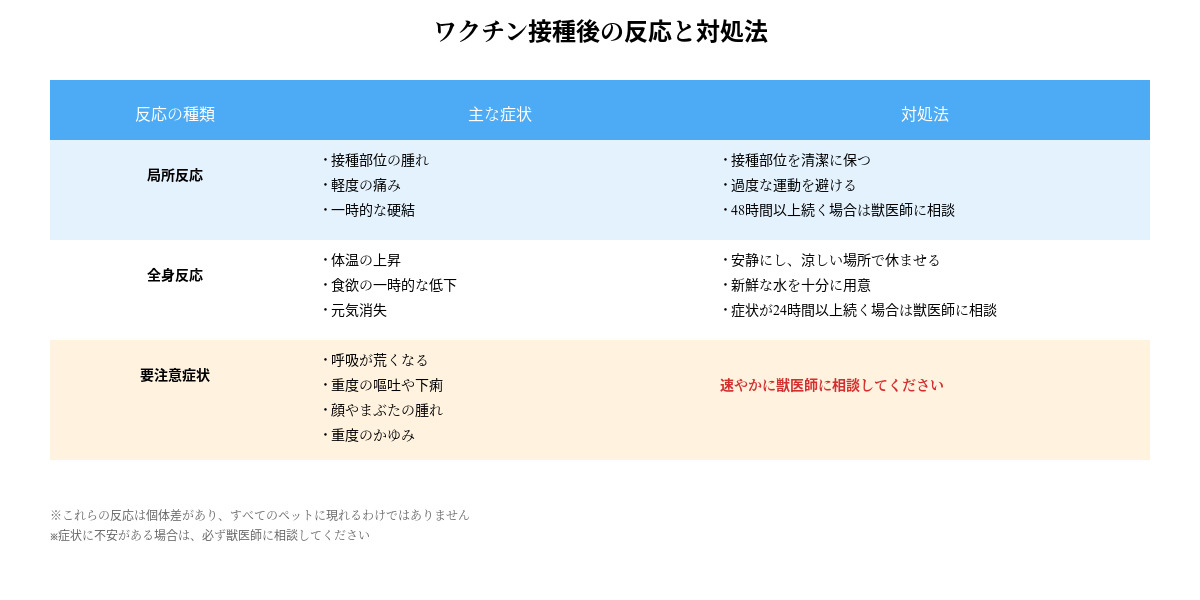
After vaccination, individuals may experience a variety of reactions. Many of these are temporary and will improve spontaneously with appropriate measures. However, if any worrisome symptoms are observed, consult your veterinarian immediately.
Reactions that may be seen after vaccination
1. local reaction
- symptom
Swelling, mild pain, and temporary induration at the site of inoculation
- dealing with
* Keep inoculation site clean.
* Avoid excessive exercise
* If swelling is severe or lasts longer than 48 hours, consult a veterinarian.
2. systemic reaction
- symptom
* Increase in body temperature
* Temporary loss of appetite
* Lost energy
- dealing with
* Rest and keep at rest in a cool place.
* Prepare plenty of fresh water.
* Consult a veterinarian if
- If high fever persists
- Significant loss of energy and appetite
- If symptoms persist for more than 24 hours
[Caution.
Consult your veterinarian immediately if you experience any of the following symptoms
- breathing heavily
- Severe vomiting or diarrhea
- Swelling of the face and eyelids
- be disoriented
- Severe itching
How to respond to emergencies and post-travel vaccine care
Important emergency contact list
Contact information to be prepared prior to travel
- Local 24-hour veterinary clinic
- List of emergency hospitals in major cities
- Information on Hospitals with Japanese Language Services
- Contact information for diplomatic missions abroad
- Embassy/Consulate emergency phone numbers
- Consular Sub-Branches Contact Information
- Emergency Contact for Pet Transport Companies
- 24-hour hotline
- Local Support Desk
Post-travel vaccine management
1. maintenance of vaccination records
- Storage of digital records
- Backup in cloud storage
- Photo storage on smartphones
- Paper certificate
- Separate management of originals and copies
- Storage in waterproof case
2. additional local vaccination schedule
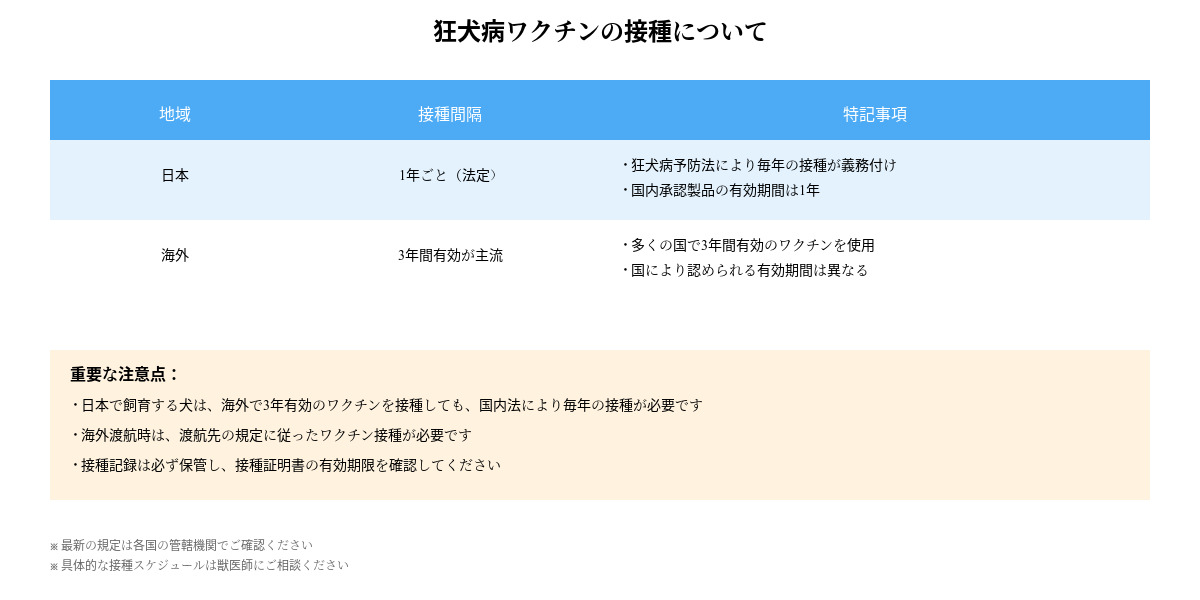
3. key points of health care
- Regular health checks
- Weighing (once a week)
- Observation of appetite and activity level
- Skin and coat condition check
- Observation of adaptation to environmental changes
- Climate adaptation status
- Response to Local Food
- Presence of stress signs
Frequently Asked Questions (FAQ)
Q1: What is the approximate total cost of vaccination?
Approximate cost of basic vaccinations and tests required for travel (as of 2024):
- Mixed vaccine: 8,000-12,000 yen
- Rabies vaccine: 6,000-10,000 yen
- Antibody titer test: 15,000-20,000 yen
- Medical examination and issuance of certificate: 10,000-15,000 yen
- Total: approx. 40,000-60,000 yen
*Fees vary by region and hospital. Additional fees will be charged if additional vaccines or tests are required.
Q2: What precautions should I take with puppies and kittens?
Limitations and precautions based on age:
- Minimum Age Requirement:
- Must be at least 12 weeks old (about 3 months) in most countries
- Rabies vaccine can be given at 91 days of age or older
- Recommended waiting period:
- Establishment of basic immunity: at least 6 months of age is desirable
- Formation of stress tolerance: 8 months of age or older recommended
Q3: What special considerations apply to older pets?
- Prior comprehensive medical examination is required.
- If there is an underlying disease, a detailed consultation with a veterinarian is required
- Longer follow-up period after vaccination
- Choose a mild season for your trip
Q4: What are the necessary procedures when returning home?
Procedures required when returning to Japan:
- Required Documents:
- Valid rabies vaccination certificate
- Rabies antibody testing
- Health certificate issued by a government agency of the country in which you are staying
- Certificate of inspection in the exporting country (if required)
- Preliminary procedures:
- Advance notification to the animal quarantine station (up to 40 days in advance)
- Reservations and confirmations to airlines
Summary: For safe international travel
Final confirmation of key points
- Prepare well in advance (at least 6 months in advance).
- Creation of immunization schedule for essential vaccines
- Confirmation of destination country regulations and preparation of required documents
- Health Care
- Conduct periodic health checkups
- Post-vaccination follow-up
- Document management
- Separate management of originals and duplicates
- Creating Digital Backups
- Local Preparation
- Securing a reliable veterinary hospital
- Create emergency contact list
Safe and secure overseas travel with pets.

There are many things to prepare for, such as regulations, required documents, and transportation procedures in each country, which can be very anxious.
PetAir JPN will be there for such anxieties of pet owners and provide full support from travel planning to arrival.
Support in preparing necessary procedures and documents
■ Safe and comfortable transportation options
Reliable support until arrival
Reliable Support System✓ Courteous and experienced staff
✓ Understand and respond to the latest regulatory information from each country
✓ Thorough safety management during transportation

Detailed description of the actual time involved in the international shipping process for pets. The typical 90-125 hours of work can be reduced to just 8-11 hours with the use of experts. A thorough guide to the entire process and the nine time-saving benefits. Supports safe and efficient international travel for pets.
Please share your experiences and opinions!

Do you have any experiences or questions about traveling abroad with your pet?
If you have actually experienced this, please share with us the points you took care of in your preparation and any problems you had while traveling. We also welcome questions from those who are thinking of traveling to Japan in the future.
Please feel free to comment on any concerns you may have, such as
Your comments will be of great help to others who are struggling with the same issues. Please share your thoughts and questions in the comments section below!
![Support for pets traveling and moving overseas|PetAir JPN [Official] for international transportation and quarantine procedures for dogs and cats Support for pets traveling and moving overseas|PetAir JPN [Official] for international transportation and quarantine procedures for dogs and cats](https://petair.jp/wp-content/uploads/2024/08/main_logo.png?1771052434)
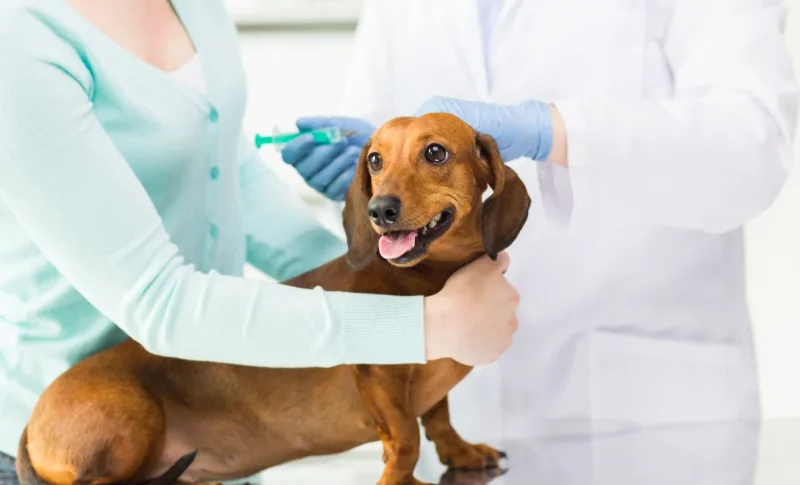


Comment